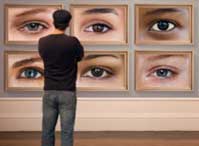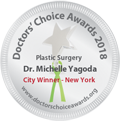 The tempromandibular joint (TMJ) works like a hinge, connecting the lower jaw to the upper one. Unlike other kinds of hinges, the TMJ has some shift in it so that the jaw can move side-to-side as well as up-and-down while you chew, talk, and yawn.
The tempromandibular joint (TMJ) works like a hinge, connecting the lower jaw to the upper one. Unlike other kinds of hinges, the TMJ has some shift in it so that the jaw can move side-to-side as well as up-and-down while you chew, talk, and yawn.
Like many complicated and delicate bits of machinery, the TMJ is prone to malfunction. TMJ disorders are caused by problems with the muscles that control the joint, the jaw, or the joint itself. Symptoms can include pain in the jaw, neck, shoulders, or face, a popping noise when you open your mouth, jaws that get stuck or locked open or shut, difficulty chewing or pain when chewing, toothaches, earaches, hearing problems, and facial swelling. Because the symptoms of TMJ disorders are easily confused with other conditions such as ear infections and sinusitis, it’s a good idea to see an otolaryngologist (an ear, nose, and throat doctor) such as Dr. Yagoda of Manhattan, NYC, New York (NY) who can make an accurate diagnosis.
Many things can cause TMJ disorders. An injury to the head or jaw, an arthritic condition, dislocation or erosion of the soft cushion (a kind of shock absorber) within the joint, or even stress, which can cause you to grind or clench your teeth, damaging the TMJ. Dental misalignment can also contribute to the problem, and Dr. Yagoda will often refer her patients with TMJ disorders to a qualified dentist for additional treatment.
Many of the most effective treatments for TMJ are also the most basic. To prevent further aggravation of the joint, Dr. Yagoda suggests lifestyle measures such limiting the diet to soft foods, gently stretching the jaw, applying warm or cold compresses, and wearing a splint or night guard to prevent clenching and tooth grinding. Correcting dental problems such as missing teeth or an overbite can also help. From her New York City (NYC) and Manhattan office, Dr. Yagoda recommends managing your stress with biofeedback, meditation, physical therapy, yoga, and massage.
In addition to these lifestyle chances, Dr. Yagoda’s integrative approach incorporates herbal, holistic, and prescription medications to reduce inflammation, muscle pain, and anxiety.
If you think you might have a TMJ disorder, call our office to schedule a consultation with Dr. Yagoda or visit her office in New York City (NYC) and Manhattan. There’s no reason to live with the pain.


































